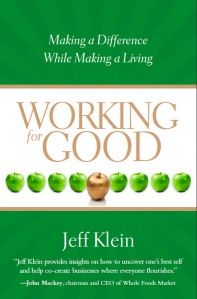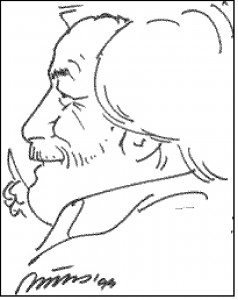
Jeff Klein. Working for Good: Making a Difference While Making a Living. Boulder CO: Sounds True, 2009.
Russ Volckmann
Not so long ago when I thought of what kind of training would best develop individuals for leader roles, I looked to people like Jim Kouzes and Barry Posner or institutions like The Center for Creative Leadership for examples that I could learn from, adapt, share with clients. Increasingly, as I have been trying to sort out the pieces of leader and leadership development I have come to believe that we are not developing leaders. We are developing individuals who can step into leader roles.
Despite the implications of the cartoon in this issue of Integral Leadership Review, I have also come to believe that at times when organizations need leaders most, we can never predict who is going to step into that leader role and perform effectively. That latter phrase is important – and perform effectively! We have been hearing a lot about assessments lately – good work by bright people, like Susann Cook-Greuter, Bill Torbert, Zak Stein and others. But assessments are rarely predictive in my view; at their best they are awareness enhancing devices that support a learning process. At their worst they offer a set of boxes that we can put others and ourselves into.
One of the things I have been impacted by, particularly over the last fifteen years of exposure to integral and developmental maps and thinking, has been the importance of practice for individual development. These practices range from meditation, to sensory awareness, to self-awareness and self-management, to communications and relationship management and so on. The Buddhist element in integral has contributed significantly to the focus on practices, as is found in Integral Life Practice.
The focus on practice, rather than a specific outcomes or a list of steps or principles, seems to me to be far more important in the development of individuals for leader roles than any list. And knowing which practices is an individual discovery based on the development one has achieved along multiple lines of development or multiple intelligences. And the needs will change as life conditions change.
Lest I have betrayed my “Green” center of gravity too much, I must point out that while the chosen practices can be very individualized, I suspect – in the spirit of the work of Sam Harris (The End of Faith, Letter to a Christian Nation, etc.) – there are probably some very basic foundational practices that are necessary – potentially with variations on the theme) – to preparing individuals to lead under conditions requiring leaders, particularly conditions of ambiguity, change and innovation. In fact there are likely to be practices required to make every worldview in the spiral healthy within the individual.
I do not purport to be expert on what those might be, but meditation seems to be one of those foundational practices in that it deepens and broadens awareness, something that would be useful to anyone in a leader role, no matter how temporary that role may be. Others might fall into categories of self-management or relationship management practices.
So, when a book such as Jeff Klein’s comes out I a great encouraged. Don’t know Jeff Klein? Jeff Klein dexcribes himself as “Activator, Author, Producer + Process Facilitator. As CEO of Working for Good, Jeff Klein activates, produces and facilitates mission-based, Stakeholder Engagement Marketing™ campaigns and Conscious Culture development programs.” Perhaps more importantly, “Jeff is a founding trustee of Conscious Capitalism, Inc. and authored the award-winning book, Working for Good: Making a Difference While Making a Living, to support conscious entrepreneurs, intrapreneurs, leaders and change agents at work.” It is no suprise that one of the founders of Conscious Capitalism, Inc., John Mackey – CEO of Whole Foods, Inc. – has a blurb on the cover of Jeff’s book.
I have been trying to get individuals I know who are associated with Conscious Capitalism, Inc. to provide information to ILR (article, Notes from the Field – whatever!) about what this group is up to. I think they have two events a year – a more open conference that includes consultants, etc., and a more tightly controlled conference of CEOs who have bought into (or want to) the conscious capitalism “movement.” When I approached Jeff about this I came away with a bit of hope that we could all learn something more. And Jeff sent me a copy of his book.
I am happy to report that Jeff’s work is more in the tradition of practices than in skill, competency or principle development. Before I go on, let’s be clear that separating out categories like this is a dangerous thing to do since there is a strong mutual influence among all of them. However, Jeff has provided us with a practice-focused approach that includes attention to awareness, connection and collaboration, as well as integration. It is replete with exercises one can do to further one’s practices. Many of the exercises are the practices. These are the practices required to follow the path of conscious business.
However, early in the book Jeff turns to Mackey to set the stage: “In his definition of Conscious Business, John Mackey suggests that the higher purpose of a business is whatever is essential to the business that aspires and motivates the entrepreneurs and other stakeholders. It does not need to be specifically focused on the greater good, as long as the purpose is true for the people involved in the business.” (27)
This definition is not a practice, but it is an approach articulated by an advocate of developing businesses where “everyone flourishes” and of this particular book. Frankly, that scares every Green fiber of my being. In my view there is a big difference between Mackey’s definition and the notion that everyone flourishes. It would be wonderful if the two naturally went together. But I see them in tension, suggesting a continuum. At one end everyone flourishes and toward to the other end only those folks in the business flourish.
Well, back to the practices. I think Jeff is spot on when he writes, “…becoming a conscious entrepreneur and change agent at work and building a successful conscious business require diligent practice: the ongoing systematic repetition of special exercises to cultivate proficiency, skill, and, ideally, mastery.” (29) The exercises he offers are not all that original, but they are offered with clarity and support. They include variations on journaling with attention to self, self in relation to other and self in relation to groups. These activities are intended to promote conscious awareness.
I will not go on listing all the practices. I will suggest that reading these as Jeff has presented them is well worth the price of the book. There are also opportunities to challenge our assumptions, e.g. attitudes toward corporations and corporate culture. His point being in this case, that bias generated from assumptions are in conflict with conscious awareness. However, I will note that it seems to me that I would much rather those in business were following the practices Jeff lays out so well.
Nevertheless, it seems to me we are living in a world that is less confidence inspiriting than one might want after reading this book. There are those who are in business who really buy into the approaches and practices that Jeff is writing about. And they are “only human,” e.g. John Mackey and his self-interested practices on the one hand and his limiting salary gaps between himself and other employees. The cynic in me wonders how much more he gets in benefits and stock options… Well, that’s the point. The CEOs who are following conscious capitalism and the practices in this book are not going to be people we necessarily would want to put on pedestals But we do want to applaud their efforts as heading in the right direction.
On the other hand, there is a world of 43 corporations who control huge proportions of the world’s wealth. They are symbolized by Wall Street, which in turn symbolizes greed, exploitation and the undermining of social structures that are necessary for equity and political and economic justice around the world. Certainly we would all be a lot better off if those folks read the work of Jeff Klein. He is not developing leaders. He is developing individuals who can step into leader roles.


